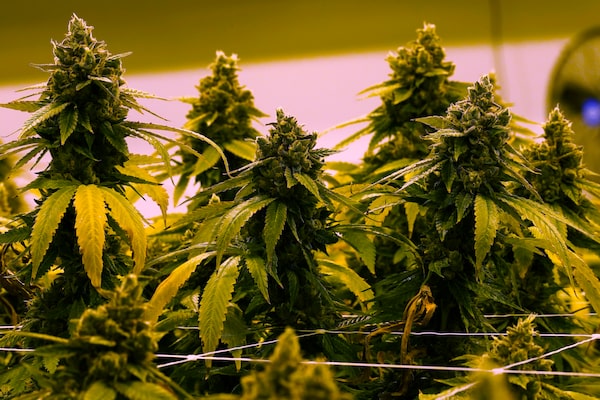
A cannibis plant that is close to harvest grows in a grow room at the Greenleaf Medical Cannabis facility in Richmond, Va., June 17, 2021.Steve Helber/The Associated Press
The U.S. House of Representatives on Friday passed a bill to end the federal ban on marijuana, which has created legal headaches for users and businesses in the states that have legalized it, though the measure was seen as unlikely to pass the Senate.
It passed by 220-204, with few Republicans supporting the measure.
The Marijuana Opportunity Reinvestment and Expungement Act, sponsored by Democratic Representative Jerrold Nadler of New York, which is in the process of legalizing the drug, removes marijuana from the list of controlled substances and eliminates criminal penalties for individuals who grow, distribute or possess it.
But the MORE act will need to gain 60 votes in the evenly divided Senate before moving to President Joe Biden’s desk for his signature, an outcome widely seen as unlikely given the lack of Republican support for the measure.
The bill would “end decades of failed and unjust marijuana policy,” Democratic Representative Ed Perlmutter said on the House floor on Thursday ahead of the vote. “It is clear prohibition is over. Today we have an opportunity to chart a new path forward on federal cannabis policy that actually makes sense.”
He added that the bill does not force any state to legalize marijuana.
Marijuana users and businesses that sell it face a complicated legal patchwork in the U.S, where 37 states have legalized it in some form -- either for recreation or medical use -- while 13 still ban it entirely.
Because federal law classifies cannabis as an illegal drug with no medical uses, researchers are severely limited in how they can study the drug and its impacts, making policy difficult to write.
Cannabis businesses are also largely blocked from the U.S. banking system because of the federal ban.
Republican Representative Michelle Fischbach called the legislation “not only flawed but dangerous,” arguing on the House floor that it did not protect minors and would encourage people to open marijuana businesses.
Legalization of marijuana is extremely popular among Americans: a 2021 Pew Research Center poll found that 91% agreed that either medical or recreational use should be allowed.
Democratic Senate Majority Leader Chuck Schumer has proposed his own bill that would legalize marijuana, and has committed to moving forward with it in April.
Our Morning Update and Evening Update newsletters are written by Globe editors, giving you a concise summary of the day’s most important headlines. Sign up today.